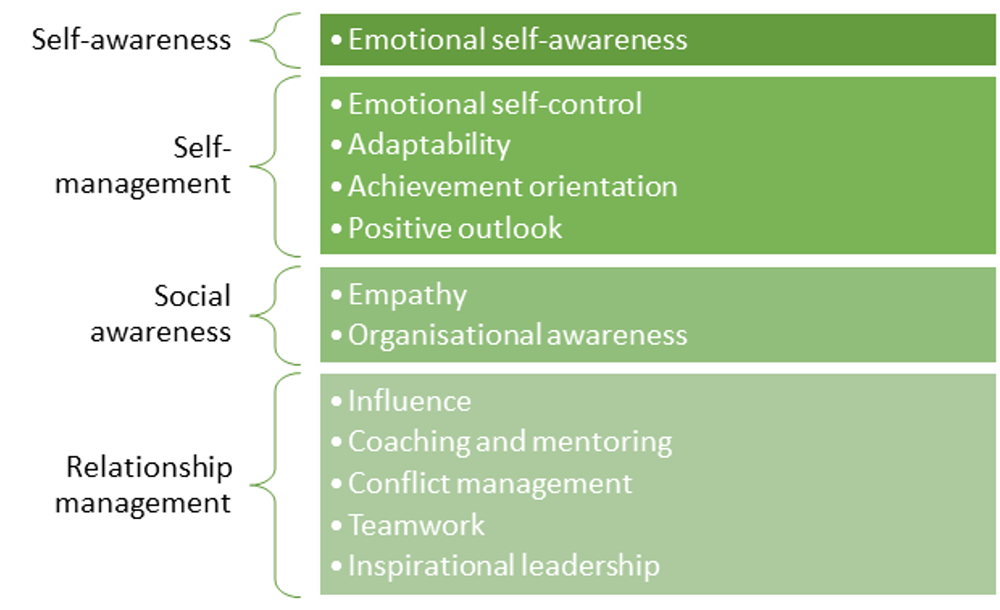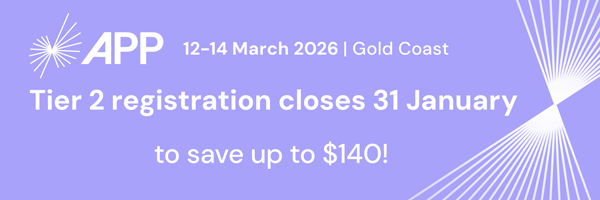Introduction
Emotional Intelligence (EI) is a term first introduced in 1990 by psychologists John Mayer and Peter Salovey. It describes the ability to perceive, understand, and manage one’s own emotions, as well as recognise and respond appropriately to the emotions of others.1
However, it was psychologist Daniel Goleman who popularised the term through his publishing of ‘Emotional Intelligence: Why It Can Matter More Than IQ’ in 1995. Goleman raised EI as an important factor to thrive successfully in life, including leadership.2
Pharmacy business owners, pharmacy managers and those seeking to step into leadership positions should seek to understand personal self-development of Emotional Intelligence, as healthcare leaders with strong EI are more likely to build more cohesive teams, foster positive workplace culture, enhance patient communication, and navigate complex interpersonal dynamics with greater effectiveness.3, 4
Emotional Intelligence
Emotional Intelligence is a concept with rising popularity in many organisations, especially within leadership and teamwork roles.4 It is the ability to identify, manage and understand your own emotion and the emotions of others, detecting nuances, to guide thinking and behaviour, relationships, and social complexities. Interestingly, Goleman’s research shows that EI makes up two thirds of the essential skills required for effective performance in a range of jobs and companies globally.4
Research indicates that individuals with higher emotional intelligence tend to be more effective in their roles, as they demonstrate skills that contribute directly to healthier and more successful business outcomes.5, 1 In many organisations, EI is now considered a fundamental and core skill for managerial and leadership positions. It has become a prominent topic across psychological and business disciplines, reflecting its growing importance in effective leadership and career advancement.6
People with high emotional intelligence possess a strong understanding of social contexts and emotional regulation. Leaders who demonstrate high EI often exhibit qualities such as warmth, openness to emotional expression, sociability, empathy, and the ability to remain composed in stressful environments. These are traits that foster trust, collaboration, and resilience within teams, thus leading to greater likelihood of overall organisational success and performance.6, 7
To understand EI better, Goleman’s framework breaks down four components that make Emotional Intelligence. These serve as the overarching domains of developing EI, categorised as self-awareness, self-regulation, social awareness, and relationship management.1
In addition to this, 12 competencies further branch from the four domains7:

Emotional intelligence refers to a different way of being smart. EI is a key to high performance, particularly for outstanding leadership. It’s not your IQ, but rather it’s how you manage yourself and your relationships with others.
Daniel Goleman
The four domains and competencies are summarised and explained a little more here:
Self-awareness8, 1
Self-awareness describes the ability for oneself to know their emotions/feelings and understand them. Individuals with selfawareness can relate their emotions to the things that they do and recognise the impact of their actions. They are also able to make an evaluation of their own weaknesses and strengths whilst being both confident and willingly open to self-development.
Self-management8, 1
Self-management involves an individual recognising what they ought to do with their emotions whilst having control over them, remaining composed even in times of pressure. It is the ability to be flexible, innovative, and conscientious of how to regulate and process themselves in difficult environments.
Social awareness8, 1
Social awareness is the ability to ‘read the room’ and sense the different emotions or perspectives of others. Leaders with good social awareness open opportunities in these settings and can recognise individual needs, showing empathy. This in turn results in improved communication, engagement, and collaboration.
Relationship management1
Relationship management refers to the ability to manage conflict effectively, influence, inspire and mentor others well. It also involves navigating disagreements, coordination and providing guidance as a coach/mentor/leader.
Self-awareness
| Self-regulation
|
Social awareness
| Relationship management
|
While some may view EI as an innate personality trait from birth, EI can be learned, developed, and taught. Although certain individuals may naturally find it easier to navigate emotional dynamics, these skills are learnable and can be developed by anyone with the determination to grow.6, 3 Unlike the Intelligence Quotient, or IQ, emotional intelligence can be developed and enhanced over time. The measurement of EI is also referred to as Emotional Quotient (EQ).
Pharmacists as Emotionally Intelligent Leaders
Is Emotional Intelligence relevant to pharmacy?
As previously discussed, individuals with higher emotional intelligence are more likely to thrive in high-performing executive roles in organisations.4 The healthcare sector should not be an exception, especially in environments where collaborative and patient-centred care are fundamental.6 EI in pharmacy should not be regarded as merely a ‘nice to know’ concept, but rather as a critical skill and strategic approach that is cultivated, driving high-quality outcomes. Members of the leadership team such as pharmacy owners and managers should be equipped with the tools to develop and practise their EI skills and be open to explore ways of improvement.
Whilst knowledge and intellect play a vital role in healthcare (particularly in clinical decision-making), the delivery of high-quality care and effective clinical governance demands more than just being ‘book smart’. Emotional intelligence, communication, and interpersonal skills are equally essential for navigating patient needs and internal team dynamics.3 In many instances, healthcare requires a team of health professionals and collaborative care, where good communication is key to safe delivery of healthcare.3
Impact on patient-centred healthcare work
Traditionally, for most health professionals, clinical training often takes precedence, while soft skills (personal and interpersonal skills) and EI are often treated as secondary considerations. However, as awareness increases around patient-centred care and collaborative decision-making, many healthcare organisations and clinically focused education content seek to include holistic patient care.9 This is where EI comes into play, and these skills should be actively developed to support more empathetic, effective, and inclusive care.
Some may argue that strengthening emotional intelligence is not as inherently important as clinical skills. However, within the Australian pharmacy sector and its practice standards, the emphasis on patient-centred care, professional responsibility, accountability, collaborative practice, and effective healthcare delivery clearly highlights the need for a strong foundation in soft skills and EI.10
Self-improvement on EI should be viewed as an essential responsibility for pharmacists, especially where the PSA Pharmacists’ Professional Practice Standards and various health guidelines continue to emphasise the importance of work practices that include person-centred care, responsibility and accountability, collaborative practice, and other core values.10 In fact, in every standard of the Professional Practice Standards document, each criterion can be performed with greater efficacy with high EI, highlighting the importance in continually developing these skills.
Impact on internal teamwork
Working in a busy, patient-facing role can often exacerbate moments of stress. The way a leader manages their team in challenging environments can significantly influence staff morale, workplace culture and subsequently the quality of work delivered.4 If leadership is ineffective or lacking, this in turn, can lead to poorer healthcare delivery and potentially harmful consequences for patients.
The ability for a worker to complete tasks efficiently and achieve KPI’s is important, however, this does not outweigh the value of clear communication, effective collaboration and fostering healthy team dynamics. They are key elements in cultivating a positive and productive workplace culture, which are crucial for achieving goals successfully and driving and sustaining business growth.1
Leaders in pharmacy should recognise that EI is not limited to leaders but should be openly encouraged within staff as a tool of self-development. Research shows that productivity, performance, and targets are met more consistently in people with higher EI.5 Additionally, high EI also encourages positive relationships and effective stress management.5
Working with Emotional Intelligence in mind
When considering EI in leadership, Norwich University recently published an infographic highlighting the impact of Emotional Quotient (EQ) stating11:
- That the difference between average and outstanding managers found that 90% was due to better EQ.
- Certain studies found that managers with welldeveloped EQ were able to outperform annual revenue targets compared to those with lower EQ.
- EQ is a stronger predictor of success in one’s field rather than IQ.
- 67% of competencies companies seek in employees are related to EQ, compared to 33% which are other competencies.
- Employees with high EQ managers are four times less likely to leave their role than those with low EQ managers.
Given the growing understanding of emotional intelligence and its connection to leadership, these principles can be practically applied across various work environments—including pharmacy.
Strategies for developing Emotional Intelligence
Understanding the concept of EI is a first step to developing higher EQ, however, putting these skills into practise is far more challenging. With the right motivation, pharmacy owners and managers can actively pursue ways to strengthen their skills in this area. EI is easily defined, but developing a new skill or behaviour requires active pursuit, a character of willingness and a desire to improve.
The human brain is capable of neuroplasticity, allowing the ability to ‘rewire’ itself and create new neural pathways throughout life. Repeated engagement in specific activities or behaviours strengthens these neural paths, effectively leading to ‘rewiring’.7 Over time, consistent practice forms new habits, which eventually become natural and automatic.7 Treatments like mindfulness and cognitive-behaviour therapy are examples of the neuroplastic abilities of the brain.12
Engaging in new habits can feel counterintuitive at first but is fundamental to the developing EI, as EI is not an innate trait. Its growth requires motivation, extensive application, constructive feedback (such as through 360-degree reviews), and through repeated rehearsal of the newly learnt skills. 8
Rate your Emotional Intelligence
The first step in personal development is to self-evaluate on your current skill level. There are various tools which help with the assessment of EI, some of which are formal and some that are easily accessible, such as the Emotional Intelligence Test on Psychology Today or from the Frameworks of Tampa Bay website, ‘Test Your Emotional Intelligence’.13, 14
You can also simply compare yourself against the 12 competencies above and determine how you currently perform in those areas. This leads to self-awareness (one of the four domains).
However, adding on other practices may also help to strengthen skills. These include:
Journaling
Revisiting your day and evaluate on your activities and tasks. Think about your performance, how you felt about the activities of the day and whether you had any positive or negative interactions. This can help you gain insight into your own behaviours and how you typically respond to specific situations/patterns.
360-degree assessment
Consult those around you including peers, colleagues, and managers on how they believe you are performing – together with both strengths and weaknesses. This can help you understand how others may perceive your work and allow you to compare this with your own self-assessment to establish whether there are any gaps or areas which require improvement.
Practise active listening
Stay actively engaged in your daily conversations. Try to focus on the speaker and listen with empathy. Paraphrasing, gesturing with nodding and maintaining eye contact can help engage in conversations.
Be aware of your emotions
Check in with yourself regularly throughout the day. Understand how you are feeling, especially in various settings and try to determine why you might be feeling that way. Understanding your own emotions is key to understanding those around you.
Try an online course or training
Many online courses or trainings are available and can assist in building on self-improvement. Just as regularly completing clinically focused CPD activities is essential, those that support EI are equally important.
Practising EI skills such as self-awareness, empathy, emotional regulation, and adaptive communication not only enhances daily interactions, but also cultivates core leadership qualities. Although changes in behaviour do not happen overnight, continuing to reinforce new habits will eventually enable leaders to feel more confident and authentic with their EI skills. Over time, this creates a humble, self-aware leader who can navigate challenging situations with clarity and compassion, resulting in impactful and resilient leadership.
Conclusion
Emotional intelligence is a dynamic and learnable skill that enables individuals to recognise and regulate their own emotions, while also being attuned to and capable of influencing the emotions of others. In today’s healthcare environment, EI is increasingly vital for accomplishing personal growth and achieving success in both business and professional career development. For pharmacy owners, managers, and those aspiring to leadership roles, proactively selfassessing EI and identifying areas for improvement should be viewed as a strategic priority. Within the healthcare workforce, EI should not be overlooked. Patient-centred care and collaborative decisionmaking, which are fundamental to holistic healthcare, rely heavily on emotional intelligence and the ability to perceive and respond to emotional dynamics.
Australia
Competencies addressed: 1.4, 2.2, 2.3, 2.4, 4.1, 4.3
Accreditation Expires: 31/08/2027
Accreditation Number: A2509AUP1
This activity has been accredited for 0.75 hr of Group 1 CPD (or 0.75 CPD credit) suitable for inclusion in an individual pharmacist’s CPD plan which can be converted to 0.75 hr of Group 2 CPD (or 1.5 CPD credits) upon successful completion of relevant assessment activities.
New Zealand
This article aims to equip you with the tools necessary to meet recertification requirements and actively contribute to the growth of your professional knowledge and skills. Effectively contribute to your annual recertification by utilising this content to document diverse learning activities, regardless of whether this topic was included in your professional development plan.
References
- L. Landry, “Why Emotional Intelligence Is Important in Leadership,” Harvard Business School Online, 25 July 2025. [Online]. Available: https://online.hbs.edu/blog/post/emotional-intelligence-in-leadership. [Accessed 25 July 2025].
- D. Goleman, Emotional intelligence: Why it can matter more than IQ, Nyew Tork: Bantam, 1995.
- A. D. Fabio, “Developing Emotional Intelligence for Healthcare Leaders,” in Emotional Intelligence - New Perspectives and Applications, Croatia, In Tech, 2012, pp. 239-256.
- B.-M. Coronado-Maldonado I, “Emotional intelligence, leadership, and work teams: A hybrid literature review,” Heliyon, vol. 9, no. 10, p. e20356, 2023.
- K. K. S. Binod Shah, “The Impact of Emotional Intelligence in the Workplace on Productivity,” International Journal of Business and Management Invention (IJBMI), vol. 13, no. 10, pp. 69-76, 2024.
- L. R. Brenda Freshman, “Emotional intelligence: a core competency for health care administrators,” Health Care Manag (Frederick), vol. 20, no. 4, pp. 1-9, 2002.
- D. L. Stoewen, “The vital connection between emotional intelligence and well-being — Part 1: Understanding emotional intelligence and why it matters,” The Canadian Veterinary Journal, pp. 65(2):182-184, 2024.
- O. Serrat, “Knowledge Solutions,” in Understanding and Developing Emotional Intelligence, Singapore, Springer, 2017, pp. 329-339.
- B. A. A. White, “Emotional Intelligence in Medical and Health Professions Education,” Harvard Medical School, 7 January 2025. [Online]. Available: https://learn.hms.harvard.edu/insights/all-insights/emotional-intelligence-medical-and-health-professions-education. [Accessed 27 July 2025].
- Pharmaceutical Society of Australia, “Professional Practice Standards,” PSA, Australian Capital Territory, 2023.
- Norwich University Online, “Emotional Quotient (EQ) and Leadership,” Norwich University online.
- P. Gazerani, “The neuroplastic brain: current breakthroughs and emerging frontiers,” Brain Research, vol. 1858, p. 149643, 2025.
- Psychology Today, “Emotional Intelligence Test,” Psychology Today, 2025. [Online]. Available: https://www.psychologytoday.com/au/tests/personality/emotional-intelligence-test. [Accessed 29 July 2025].
- “Test Your Emotional Intelligence,” Frameworks by Tampa Bay, 2025. [Online]. Available: https://myframeworks.org/testmyeq/. [Accessed 29 July 2025].
- D. Goleman, “Daniel Goleman,” Daniel Goleman, [Online]. Available: https://www.danielgoleman.info/. [Accessed 25 July 2025].










